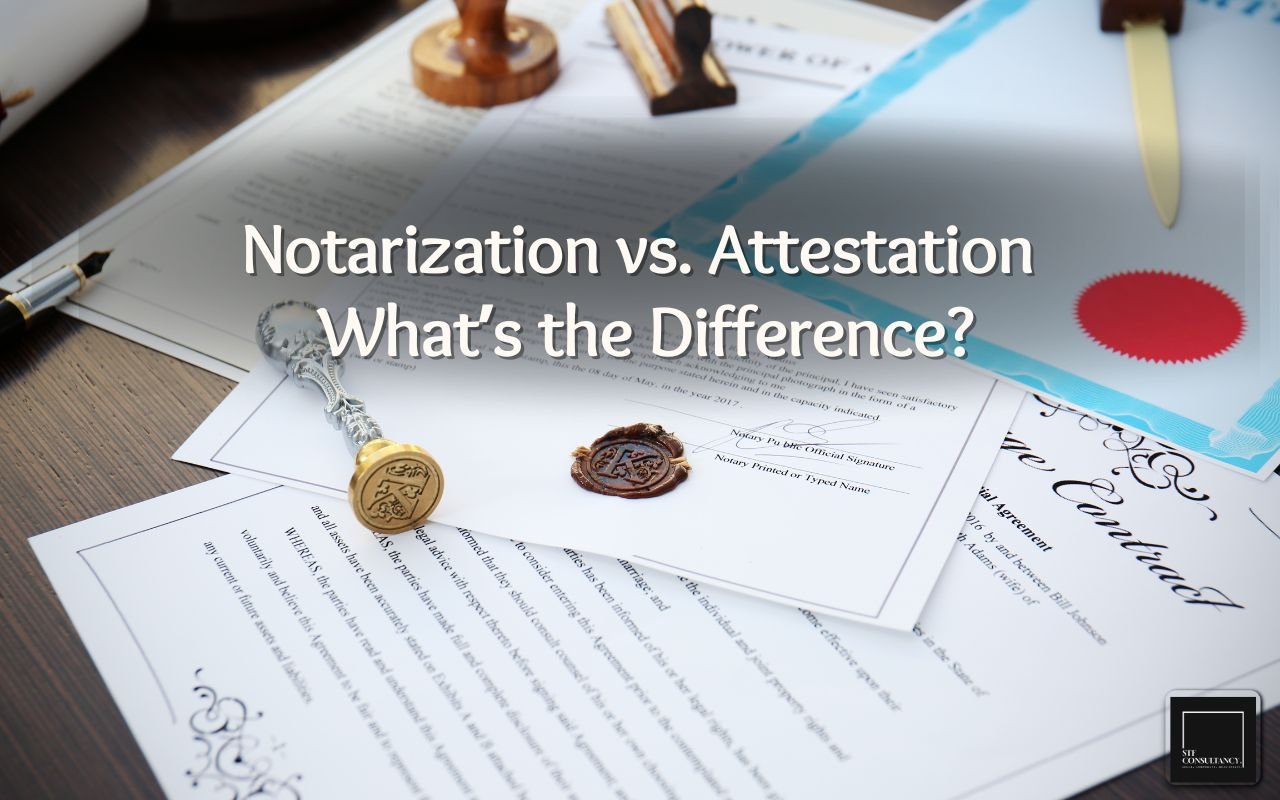In legal and official documentation, terms like notarization vs attestation are often misunderstood or used interchangeably. However, they serve distinct legal purposes and are required in different scenarios. Understanding the difference between notarization and attestation is essential for individuals dealing with real estate transactions, immigration, legal representation, or academic certifications in the UAE.
In this comprehensive guide by STF Consultancy, we break down what is notarization, what is attestation, and explain the notarization vs attestation process so you can be sure your documents are accepted without delay—whether for local use or international submission.
What Is Notarization?
Notarization is a legal process performed by a licensed notary public. Its primary role is to verify the identity of the signer and ensure the document is signed willingly and knowingly. Once verified, the notary applies an official notary seal or stamp on the document.
Attestation Process Explained
The attestation process typically follows several stages:
- Notarization (initial stage in many cases)
- Authentication by Local Authorities (Ministry or relevant government body)
- MOFA Attestation (Ministry of Foreign Affairs, especially for international use)
- Embassy Attestation (if required by the destination country)
Notarization vs Attestation – Key Differences Explained by STF Consultancy

Let’s break down the difference between notarization and attestation to avoid confusion:
Feature | Notarization | Attestation |
Performed By | Notary Public | Government/Ministry/Embassy |
Purpose | Verified signer identity & intent | Confirms document authenticity for foreign use |
Scope | Domestic | International |
Legal Value | Used in internal legal systems | Required for use in other countries |
Example Documents | Affidavits, POAs, contracts | Degrees, marriage/birth certificates |
Attested vs Notarized – Which One Do You Need?
If you’re unsure whether your document needs to be attested or notarized, consider the destination and purpose:
Use within UAE (e.g., Power of Attorney, private agreements): Notarized
Use abroad (e.g., study, employment, migration): Attested – often begins with notarization
So, when asking attested vs notarized, the deciding factor is typically document destination and institutional requirements.
Why Notarization vs Attestation Matters in the UAE
At STF Consultancy, we often meet clients who are unsure about whether they need notarization vs. attestation for their documents. Getting this wrong can cause application delays, visa rejections, or even legal non-compliance.
For example:
- A notarized Power of Attorney may not be accepted in another country unless it is also attested by MOFA and the respective embassy.
- Similarly, an attestation without proper notarization may be rejected during visa or academic applications.
By understanding notarization vs attestation, you ensure your documents meet local and international legal standards.
Common Misconceptions: Attest vs Notarized
Many people search online for answers using terms like attest vs notarized or notarized vs attested, assuming they are synonymous. While they are related, notarization is often a preliminary step in attestation. Understanding this hierarchy avoids document rejection.
How STF Consultancy Can Help
At STF Consultancy, we offer streamlined services to ensure your documents are correctly notarized, attested, or both, depending on your need. Our experts handle everything from document verification to MOFA attestation and embassy authentication, saving you time and effort.
We specialize in:
- Notarization of Power of Attorney, Affidavits, Contracts
- Attestation of Educational & Legal Documents
- Full Legal Consultancy for UAE and international use
Document Attestation in Dubai
Final Thoughts on Notarization vs Attestation
Understanding notarization vs attestation is not just legal trivia—it’s essential for making sure your documents are recognized and accepted where you intend to use them. Choosing the wrong process could mean delays, rejections, or non-compliance.
Whether you need to notarize a document for a Dubai court or attest a certificate for immigration, STF Consultancy ensures that your documentation is handled professionally and correctly the first time.
Frequently Asked Questions (FAQs)
Can a document be notarized without attestation?
Notarization is sufficient for documents used within the UAE. However, if the document is for use abroad, attestation may also be required.
Is notarization mandatory before attestation?
Most attestation procedures begin with notarization, especially for personal or private documents.
What's the main difference between notarization and attestation?
Notarization verifies identity and signature; attestation confirms document authenticity for international use. They serve different legal scopes.
Are notarized documents valid internationally?
No, not on their own. You need attestation by MOFA and sometimes an embassy for international acceptance.
Who can help me decide between notarization vs. attestation?
Contact STF Consultancy – our legal documentation experts will assess your needs and guide you through the correct process.





